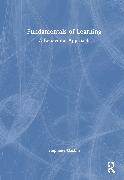Read more
This book discusses the basic mechanisms of learning. It highlights how most behaviors are learned through minimal amounts of cognitive processing and acquired through associations between stimuli.
List of contents
Module 1: The Evolution of Learning Science Chapter 1. Exploring the Pathways of Learning: From Aristotle's Laws of Association to Artificial Intelligence Chapter 2. Fundamental Concepts: Mapping the Terrain of Learning
Module Application Module 2: Innate Behaviors and Non-associative Learning Chapter 3. Unveiling Nature's Blueprint for Learning: Exploring Innate Behaviors Chapter 4. Exploring Nonassociative Learning
Module Application Module 3: The ABCs of Classical Conditioning Chapter 5. Foundations and Basic Concepts of Classical Conditioning Chapter 6. Classical Conditioning Beyond Pavlov: From Little Albert to Peter and the Rabbit
Module Application Module 4: Behavioral Adaptations, Determinants, and Modeling of Classical Conditioning Chapter 7. The Power and Adaptive Functions of Classical Conditioning Chapter 8. Unravelling the Building Blocks Classical Conditioning Chapter 9. Cracking the Code: Modelling Classical Conditioning
Module Application Module 5: The Fundamentals of Operant Conditioning and Types of Reinforcers Chapter 10. From Puzzle Boxes to Skinner Boxes: The Fundamentals of Operant Conditioning Chapter 11. Reinforcers: How they work and what makes them effective?
Module Application Module 6: Reinforcement and Extinction Chapter 12. Theories of Reinforcement Chapter 13. How does it come together? The Associative Structure of Instrumental Conditioning Chapter 14. Exploring the Dynamics of Extinction
Module Application Module 7: The Principals of Stimulus Control and Behavioral Effects of Stimulus Discrimination Chapter 15. Under Stimulus Control: The Environment's Influence on Behavior Chapter 16. Fine-Tuning Behavior: The Behavioral Effects of Stimulus Discrimination
Module Application Module 8: Choice Behavior and Self-control Chapter 17. Choice, Choices, Choices: Choice Behavior Unveiled Chapter 18. Do good things come to those who wait? Unraveling the Mechanisms of Self-Control
Module Application Module 9: Avoidance Behaviour and Punishment Chapter 19. Surviving in a Potentially Dangerous Environment: Understanding Avoidance Behavior Chapter 20. Punishment
Module Application Module 10: Cognitive psychology, Comparative Cognition, Memory and Navigation Chapter 21. The Surprisingly Complex Behavior of Animals: Cognitive Psychology and Comparative Cognition Chapter 22. Tracing One's Path: Memory and Navigation
Module Application References
Index
About the author
Stéphane Gaskin is a psychologist, behavioural neuroscientist, and educator with extensive experience teaching at both college and university. With a PhD in psychology and behavioural neuroscience from McGill University, he has dedicated his career to exploring the cognitive, social, and neurobiological aspects of human behavior.

